Industry Party Erhvervspartiet | |
|---|---|
| Founded | 1917 |
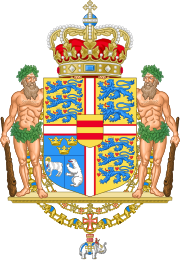 |
|---|
The Industry Party (Danish : Erhvervspartiet) was a political party in Denmark in the 1910s and 1920s. It aimed to represent small and medium traders, primarily in Copenhagen.
Industry Party Erhvervspartiet | |
|---|---|
| Founded | 1917 |
 |
|---|
The Industry Party (Danish : Erhvervspartiet) was a political party in Denmark in the 1910s and 1920s. It aimed to represent small and medium traders, primarily in Copenhagen.
The party was established in 1917, [1] and received 1% of the vote in the 1918 elections, when it won a single seat. [2] The party increased its vote share to 3% in the April 1920 elections, winning four seats. It maintained its four seats in the July 1920 elections, but was reduced to three seats in the September 1920 elections. [2]
In 1922 the party split in two, with both factions significantly weakened. [1] In the 1924 elections the party received just 0.2% of the national vote and lost all three seats. [2]
| Election | Votes | % | +/– | Seats | +/– |
|---|---|---|---|---|---|
| 1918 | 11,934 | 1.30 | New | 1 / 140 | New |
| April 1920 | 29,464 | 2.88 | +1.58 | 4 / 139 | |
| July 1920 | 25,627 | 2.69 | –0.19 | 4 / 139 | |
| September 1920 | 27,403 | 2.26 | –0.43 | 3 / 148 | |
| 1924 | 2,102 | 0.16 | –2.10 | 0 / 148 |

Euroscepticism, also spelled as Euroskepticism or EU-scepticism, is a political position involving criticism of the European Union (EU) and European integration. It ranges from those who oppose some EU institutions and policies and seek reform, to those who oppose EU membership and see the EU as unreformable. The opposite of Euroscepticism is known as pro-Europeanism.
The electoral threshold, or election threshold, is the minimum share of votes that a candidate or political party requires before they become entitled to representation or additional seats in a legislature.

The D'Hondt method, also called the Jefferson method or the greatest divisors method, is an apportionment method for allocating seats in parliaments among federal states, or in proportional representation among political parties. It belongs to the class of highest-averages methods. Compared to ideal proportional representation, the D'Hondt method reduces somewhat the political fragmentation for smaller electoral district sizes, where it favors larger political parties over small parties.
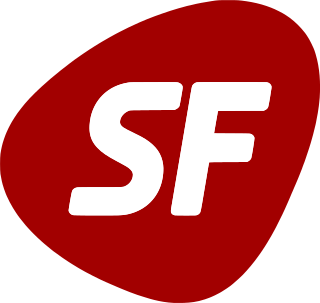
The Green Left is a democratic socialist political party in Denmark.

Venstre, full name Venstre, Danmarks Liberale Parti, is a conservative-liberal, agrarian political party in Denmark. Founded as part of a peasants' movement against the landed aristocracy, today it espouses an economically liberal, pro-free-market ideology.
The Conservative People's Party, also known as The Conservatives is a centre-right political party in Denmark. The party is a member of the International Democracy Union and the European People's Party.
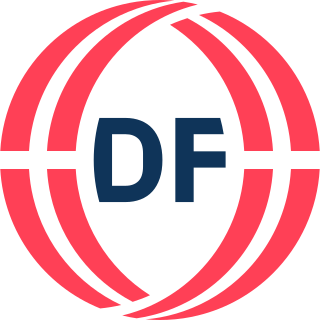
The Danish People's Party is a nationalist and right-wing populist political party in Denmark. It was formed in 1995 by former members of the Progress Party (FrP).

The South Schleswig Voters' Association is a regionalist political party in Schleswig-Holstein in northern Germany. The party represents the Danish and Frisian minorities of the state.

The Christian Democrats are a political party in Denmark. The party was founded in April 1970 as the Christian People's Party to oppose the liberalization of restrictions on pornography and the legalization of abortion. The party renamed itself to its current name in 2003. Originally, the party was not considered part of the European Christian-democratic tradition, and it was better known as a religious conservative party.
The Red–Green Alliance or Unity List is an eco-socialist political party in Denmark. It was founded in 1989 with the merger of three Marxist parties and it is the most left-wing party in the Folketing, where it advocates for the expansion of the welfare state and social justice as well as the socialist transformation of Denmark and the entire globe. During the 2021 Copenhagen City Council election the party placed first, with 24.6% of the votes. The party is also active in various trade unions within Denmark.
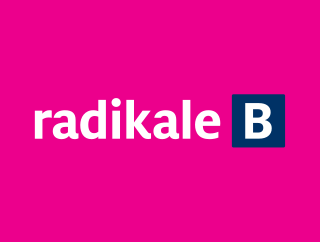
The Danish Social Liberal Party is a social-liberal political party in Denmark. The party was founded as a split from the Venstre Reform Party in 1905.

The Progress Party is a right-wing populist political party in Denmark which was founded in 1972.

There are three types of elections in Denmark: elections to the national parliament, local elections, and elections to the European Parliament. Referendums may also be called to consult the Danish citizens directly on an issue of national concern.

Republic, formerly known as the Republican Party is a pro-independence left-wing political party in the Faroe Islands.

The Social Democratic Party is a social-democratic political party on the Faroe Islands, led by Aksel V. Johannesen.
The Liberal Alliance is a classical liberal and right-libertarian political party in Denmark. The party is a component of the centre-right bloc in Danish politics. The party's platform is based upon economic liberalism, promotion of tax cuts and reduction of welfare programmes, and a critical, oppositional stance towards European integration.

The politics of Denmark take place within the framework of a parliamentary representative democracy, a constitutional monarchy and a decentralised unitary state in which the monarch of Denmark, King Frederik X, is the head of state. Denmark is a nation state. Danish politics and governance are characterized by a common striving for broad consensus on important issues, within both the political community and society as a whole.

The Beloved Fatherland Party is a political party in Paraguay.
The Liberal Centre was a political party in Denmark between 1965 and 1969.
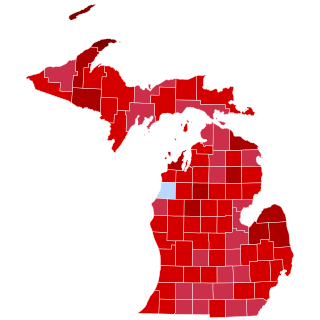
The 1920 United States presidential election in Michigan took place on November 2, 1920, as part of the 1920 United States presidential election. Voters chose 15 representatives, or electors, to the Electoral College, who voted for president and vice president.